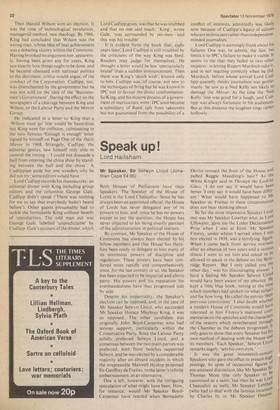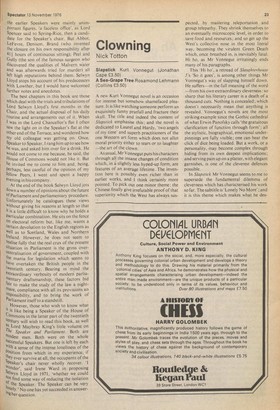Speak up!
Lord Hailsham
Mr Speaker, Sir Selwyn Lloyd (Jonathan Cape £4.95) Both Houses of Parliament have their Speakers. The Speaker of the House of Lords is the Lord Chancellor. Since he has always been an appointed official, the House of Lords has never delegated arty of its powers to him, and, since he has no powers except to put the question, the House has never objected to his being overtly partisan of the administration in political matters.
By contrast, Mr Speaker of the House of Commons has always been elected by his fellow members and that House has therefore been ready to delegate to him many of its enormous powers of discipline and regulation. These powers have been conferred more rapidly and comprehensively since, for the last century or so, the Speaker has been expected to be impartial and above party. His powers and his reputation for evenhandedness have thus progressed side by side.
Despite his impartiality, the Speaker's election can be opposed, and, in the case of Mr Speaker Selwyn Lloyd, who succeeded Mr Speaker Horace Maybray King, it was so opposed. The other candidate was originally John Boyd-Carpenter who had serious support, particularly within the Conservative Party. Since the Labour Party solidly preferred Selwyn Lloyd, and a consensus between the two main parties was preferred, both front benches supported Selwyn, and he was elected by a considerable majority after an absurd incident in which the irrepressible Maxwell Hyslop proposed Sir Geoffrey de Freitas, to the latter's infinite embarrassment, as an alternative.
One is left, however, with the intriguing speculation of what might have been. How, for instance, would Mr Speaker Boyd' Carpenter have reacted when Bernadette
Devlin crossed the floor of the House and pulled Reggie Maudling's hair? As the White Knight said in Through the Looking Glass, :I do not say it would have been better. I only say it would have been different.' What would have happened to Mr Speaker de Freitas in these circumstances does not bear thinking about.
By far the most impressive Speaker I ever met was Mr Speaker Lowther who, as Lord Ullswater, gave me the Loder Declamation Prize when I was at Eton. Mr Speaker Fitzroy, under whom I served when I was first elected in 1938, was a terrifying figure. When I came back from service overseas after an absence of two years and a serious illness I went to see him and asked to be allowed to speak in the debate on the Beveridge Report. 'But I only called you the , other day,' was his discouraging answer. have a feeling Mr Speaker Selwyn LloYd would have been aware. of my absence. 14' kept a little blue book, noting at the tinle which members had spoken on what subjee.t and for how long. He called the entries 'their previous convictions'. I also doubt whether a modern House of Commons would have tolerated in him Fitzroy's muttered Corn rnentarias on the speeches and the characters of the orators which reverberated through the Chamber as the debates progressed. It only goes to show that every Speaker has tos own method of dealing with the House and, its members. 'Each Speaker,' Selwyn Lloyo remarks sagely, 'sets his own style.' It was the great nineteenth-cent Speakers who gave the office its present high, prestige. In spite of occasional figures 0.1 pre-eminent distinction, like Mr Speaker Sir Thomas More (the only Speaker to hed canonised as a saint, but then he was Lor„ Chancellor as well), Mr Speaker Lenthao (who had to deal with the famous incursion by Charles I), or Mr Speaker Onslosv,
the earlier Speakers were mainly unimportant figures, a faceless office', as Lord Spencer said to Spring-Rice, then a candi date for the Speaker's chair. But Abbot, LeFevre, Denison, Brand (who invented the closure on his own responsibility after
411 hours of continuous sitting). Peel and
Gully (the son of the famous surgeon who discovered the qualities of Malvern water and was afterwards tried for murder) all left high reputations behind them. Selwyn Lloyd stops his account of his predecessors With Lowther, but I would have welcomed further notes and anecdotes.
The best chapters in this book are those Which deal with the trials and tribulations of Lord Selwyn Lloyd's first months in the Chair, and the actual disposal of his daily routine and arrangements out of it. When I was in the Lord Chancellor's flat I often saw the light on in the Speaker's flat at the Other end of the Terrace, and wondered how my old colleague was getting on. Once. Speaker to Speaker, I rang him up to see how he was, and asked him over for a drink. He would not come to me because, he said, the House of Commons would not like it. But he invited me to come to him and, being, Perhaps, less careful of the opinion of my fellow Peers, 1 went and spent a happy even i ng in his company.
At the end of the book Selwyn Lloyd jots clown a number of opinions about the future of Parliament and parliamentary procedure. Unfortunately he catalogues these views Without giving his reasons at length so that it is a little difficult to know why he holds a Particular combination. He sits on the fence O n electoral reform but, like me, wants a certain devolution to the English regions as Well as to Scotland, Wales and Northern Ireland. However, he does not seem to realise fully that the real crux of the present situation in Parliament is the gross overcentralisation of government, coupled with
the mania for legislation which seems to have overtaken the British people in the twentieth century. Bearing in mind the extraordinary verbosity of modern parliamentary draftsmanship, these factors bid fair to make the study of the law a nightMare, compliance with all its provisions an IMPossibility, and to bring the work of Parliament itself to a standstill.
, However, those who wish to know what It is like being a Speaker of the House of Cornmons in the latter part of the twentieth century will wish to read this book, as well 4,rs Lord Maybray King's little volume on he Speaker and Parliament. Both are Modest men. Both were on the whole successful Speakers. But one is left by each With a sense of the intense loneliness of the *Position from which in my experience, if heY ever survive at all, the occupants of the 'peaker's chair never wholly recover. 'I ,,vonder', said Irene Ward in proposing eiwyn Lloyd in 1971, 'whether we could licit find some way of reducing the isolation re the Speaker. The Speaker can be very ;nelY.' No one has yet succeeded in answermg her question.



































 Previous page
Previous page